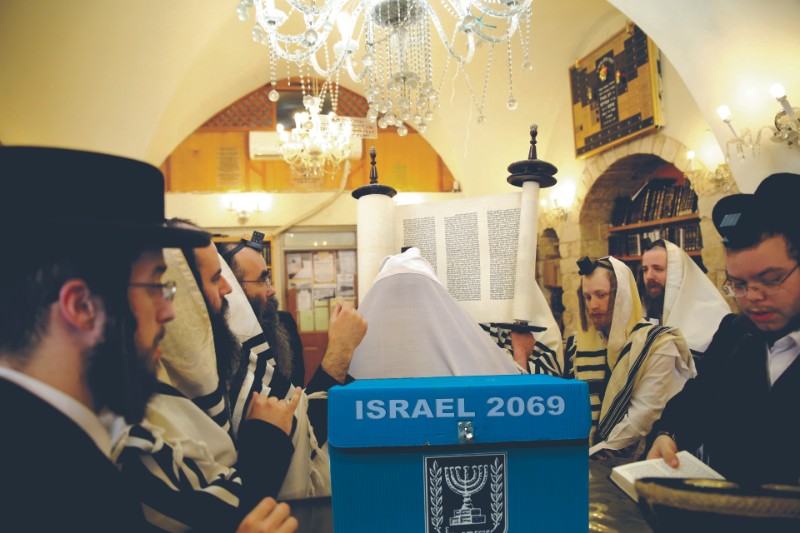Israelis congregated in sombre reflection on April 9, 2069 to commemorate the 50th anniversary of their twice-annual ritual, the Calling of the Election.
In Jerusalem, Hasidic Jews flocked to the Kotel to recite the Tefilat ha-Bechirot (Prayer of the Election), before gathering around their dinner tables with loved ones to collectively open Israel’s voting app and partake in what many still believe is a valid electoral process.
“I know it’s a silly ritual,” said Golda Firstein, 43, who was heading home to begin the voting process at sundown. “But when you think about it, it’s about as logical as waving a fake lemon in a tree house you built in your backyard.”
After 50 years, Israel’s two leading parties, Likud and Blue and White, remain tied for first place, each retaining around 5 per cent of the vote. The remaining 90 per cent is evenly split between the other 30 parties theoretically represented in the Knesset, which has not convened in more than 40 years.
In Tel Aviv, the acting leader of the Likud party, Moishe Mendelson, held a massive rally in Yarkon Park, garnering crowds of over 10,000 people.
“Our beloved leader, Benjamin Netanyahu, would be proud to see us carrying on his tradition,” Mendelson proclaimed. “Had he not died in jail in 2048, wrongfully sentenced to live out the final years of his life in prison due to made-up charges of corruption, he would still stand with us today, fighting that great fight to form an actual government.”
Because Netanyahu was never defeated in an election, Mendelson reminded audience members, the late leader remains the legal prime minister of the State of Israel, more than 20 years after his death.
“Our great nation has never formed a government since 2019,” Mendelson roared to his supporters. “You know why? Because we never found anyone good enough to replace Bibi!”
The Calling of the Election began exactly 50 years ago, when Israelis first went to the polls on April 9, 2019, without any political party garnering enough votes to form a government. In those days, Israel had elections similar to those of other countries: citizens would show up to polling booths, cast votes on paper ballots and expect someone to win.
In the decades since, the event has evolved to include prayer, family gatherings and mourning, making it a solemn reminder of the social division, economic failure and skyrocketing crime rate that defines Israel in the 21st century.
In the days leading up to the Calling of the Election, many politicians also report their largest fundraising numbers of the year. Numerous activists have tried to transform the political system, including influential author David Grossman, who has described the Calling of the Election as “a more depressing routine than Yom Kippur.”
In the 2020s, Grossman led a grassroots campaign with the hashtag #PleaseGodLetThisEndAlready, which aimed to change the nation’s complicated proportional representation voting system to ranked ballots, first-past-the-post or a higher threshold of what constitutes a legal party.
Despite that campaign, and multiple similar efforts over subsequent years, Israelis have never been able to agree on another system.
“We came quite close when Bibi was sentenced to jail in 2034,” recalls Adi Haddat, author of Why The Hell Are We Still Doing This?: A Complicated History of Israel’s Complicated Elections.
Haddat says, after Netanyahu’s conviction, “there was more national hope for the future than during the Oslo Accords.”
Optimism dissolved, however, once leaders from the Blue and White party realized Likud still planned on keeping Netanyahu on as leader, nullifying any possibility of a coalition.
“Nobody expected Netanyahu to run again,” Haddat says. “Nobody thought it was even legal. But without a proper government to challenge it, he faced no real opposition.”
Months after his imprisonment, Netanyahu teleconferenced into the annual Likud convention via WhatsApp and delivered a rousing speech in which he spoke the now-famous line inscribed on his tombstone: “You can convict me, you can imprison me, you can bankrupt me – and people will still vote for me!”
Benny Gantz, 109, who has led the Blue and White party since its inception, was unavailable for comment. Five years ago, Gantz suffered a debilitating heart attack after misreading poll results, mistakenly believing Blue and White had actually won.
Across the border, in the State of Palestine, leaders expressed sympathy for their struggling neighbours.
“Twenty years ago, we were lucky to establish, with the help of European nations and the United States, a viable democratic government using a logical electoral system,” said Palestinian President Aboud al-Bazragh. “We are saddened to see our friends in Israel tormented in this political purgatory. Israeli economic migrants know our message well: our doors are always open to you.”
